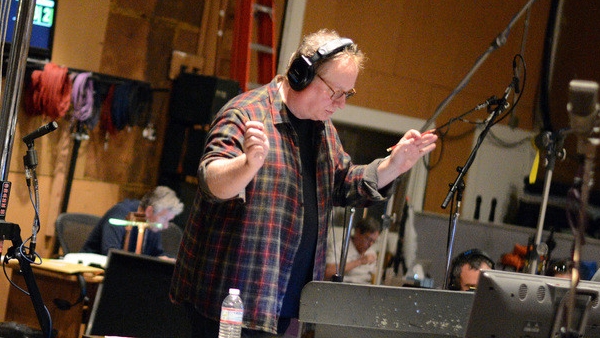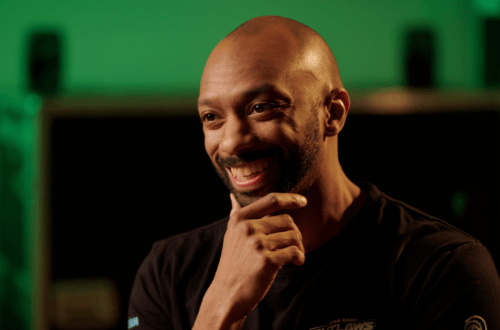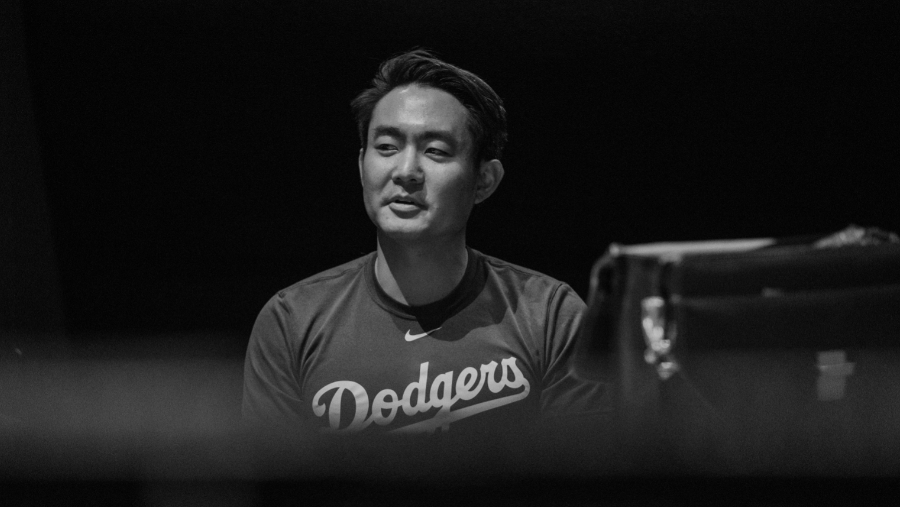
Composer extraordinaire, Roger Suen, has lent his expertise to numerous feature films, television series and documentaries. A Southern California native, Suen studied music composition as an undergraduate then graduate student at UCLA and CSUN.
Suen’s diverse music portfolio includes scoring additional music for Guillermo Del Toro’s four-time Oscar winning film The Shape of Water, Netflix’s five-time Emmy-nominated series Daredevil, and Marvel’s Emmy-nominated series, The Defenders.
Through his mastery of orchestral composition and modern electronica, he has created heart-pounding additional music for blockbuster films such as Oscar-nominated X-Men: Days of Future Past, X-Men: Apocalypse, and The Nice Guys.
This year, Suen provides the score the modern Asian-American drama film, Ms. Purple, which premiered on January 25 at the Sundance Film Festival. Climber, surfer, composer, trombone advocate, and all-around nice guy, allow us to introduce you to Roger Suen.
GoSeeTalk: Your score to Ms. Purple has a very varied palette. How did you decide on that dynamic when writing the music?
Roger Suen: This is the second film Justin Chon and I worked on; the first was Gook which also premiered at Sundance a few years ago. We met through a mutual acquaintance, and we really clicked on a personal and working level. Like you said, the score is very varied, and so far, at least in these two projects, that seems to be our trademark. It’s a combination of what both of us like to listen to personally, letting each cue do what it is supposed to do, and not getting tied down to any one idea helps give an eclectic nature to the score. I think that Ms. Purple is toned down compared to what we did with Gook.
Speaking to how varied your work here is, how do you approach the score in a way that feels like a studio album as opposed to a main theme that develops over a film’s run time?
In terms of thematic development, they were different. In Gook, the main character, Kamilla, had a main theme that we used in the different genres – we had a jazz piece, a French café piece, it was also in a solo piano piece, etc. In Ms. Purple, we had a main character theme, and a theme for her brother, but we stayed within their genre. Her theme was a string quartet, and his was a guitar theme, and you only hear their themes with their instruments. [Laughs] I’d like to say we planned it all out in advance, but we just threw a lot at the film to see what worked the best.
In mainstream projects, we have a more traditional approach where the entire score is more or less the same style of music, and the thematic development is as you would expect in a traditional score.
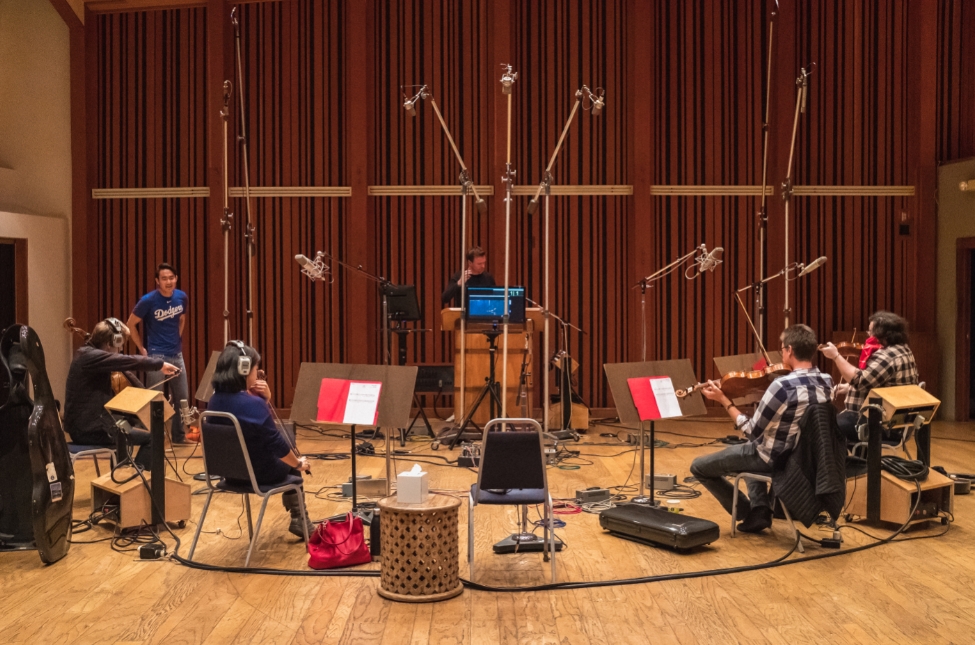
One of the cues, “Dad,” really hit me because it is so reminiscent of a theme Alan Silvestri wrote for Who Framed Roger Rabbit. His ”Eddie Valiant theme” is very much in the vein of Miles Davis. I love that, and have been searching for something like it for years – your cue is the closest thing I’ve ever found/heard. How much do you compose, and how much is left to the player?
That’s the only cue in the film that is a little jazz combo. We had something moody that was similar in Gook – very Miles Davis – and Justin and I joke that every film we do, even if it’s a sci-fi story, we’re going to put some jazz into it. [Laugh] We both love the melancholy emotional effect that you get from that sound. Like you said, I’m surprised that we don’t see that a lot more.
When I write, it’s not quite a lead sheet where you have the melody, and chord changes. I try to give a little more direction to get what would sound like little improvised riffs. I try to give some direction, but I tell the players that if they think of something better we’ll try it, or if something doesn’t feel right, then we’ll get rid of it. For this I think it worked. We did a couple versions then picked the one we liked.
How do you write for an instrument you don’t play? The main theme is built around violins, right?
Before we went into the session, I had this whole speech I was going to give the players about the back story, and how this should go. [Laughs] But the first run through we did was pretty much what I wanted it to do. So I threw out my whole speech, and was like, “OK, since you guys got it, let’s start recording!” If I’ve done my job right, on the paper, it should translate, more or less.
I’m a trombone player which is as far from a string orchestra as you could possibly get. That’s when you really have to study and listen a lot to other music. That kind of stews in your head over the years, and gets regurgitated when you write.
I think that most people will think the main theme features a violin solo, but it’s actually a viola, which I don’t think gets a lot of love. I love the instrument and it’s just a little off; not quite as bright as a violin and not as soft as a cello. I’d write more for it if I could.
How do you write for a small, boutique assignment versus carrying a narrative thread across long-form TV, like with Daredevil?
It’s pretty similar actually. When you come up with themes, you have to think of the long game, and know that it’s malleable enough to be used in a number of different ways. Ms. Purple is 80 minutes versus a TV show that could be ten hours. A versatile theme will do the work itself, in a way, whether the run time is long or short. Over a TV series, you get a lot more space to try things out, and if Ms. Purple were ten hours long, I’m sure we could take it different places. But 80 minutes is enough time to let a theme have some room to grow.
When I spoke to Joel Mc Neely, he talked about producing his albums to keep the listener from having audience fatigue. I like hearing the scoring sessions, as lengthy and repetitive as they may be, but I understand what he means.
[Laughs] We tend to regard our music as our babies, and we tend to love every little bit. It’s a challenge to keep that perspective that people outside the movie or TV show might have. I had a really great experience about this when my parents came to one of my scoring sessions.
My Dad loves music, and he’s the reason I got started in music in the first place. He goes to lots of concerts, and when they came to the scoring session, about an hour-and-a-half in, he and my Mom were like, “OK, we’re going to head out.” [Laughs] I was like, “You’ve gone to every one of my school concerts when I was a little kid, and you can’t sit through more than an hour of my scoring session?” But, in retrospect, I get it – you’re having the players do the same thing over, and over again – but I always laugh at that story.
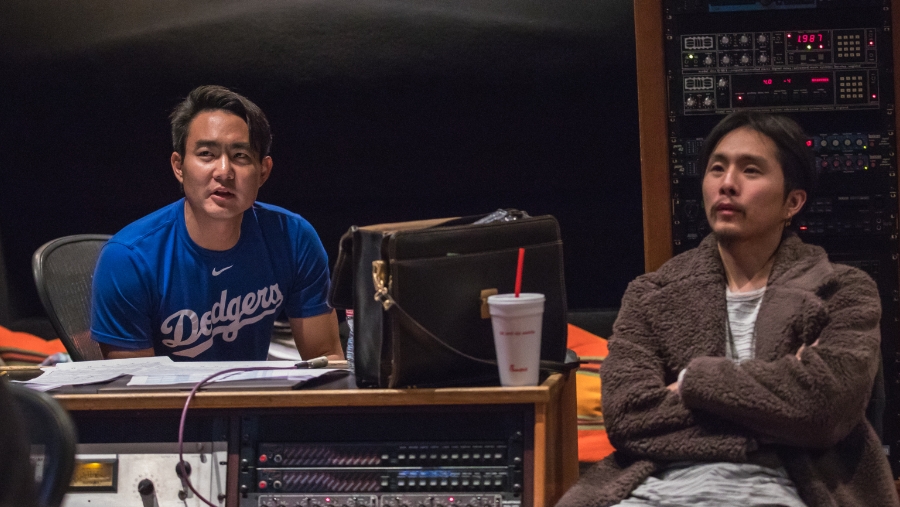
In the Special Features to Signs, M. Night Shyamalan tells James Newton Howard that he wants the orchestra to give a particular cue “5% more love.” And Howard looks at him like, “how do I do that?” What kind of feedback or direction have you gotten that has been funny or made you scratch your head?
From a musician standpoint, all requests are pretty funny because most of the people you work with don’t have a music background. It’s always a different language, so it’s kind of humorous. That’s the biggest job of the composer.
Justin likes to bring personal examples and stories to our discussions. When we worked on one cue, he said “Think of this scene as a time when you got in a fight with a family member, or your parents, and you felt really bad about it afterwards because you were being a jerk.” I thought that was such a specific kind of conflict, but I totally know what that feels like so that was great direction. Now how that becomes music is my job, but using things we all can relate to as a way to communicate what he wants helps tremendously.
How much do you feel that your music aligns with your personal tastes, and do you try to shoehorn things you like into a score?
I feel more like a craftsman than an artist – like a guy who’s going to remodel your home. Composing for films shouldn’t be an expression of my truest self – it’s crafting what the director and movie needs. I love what I do, but as far as injecting my own stamp on things, that comes without trying.
Everything you write is going to sound like you because it’s all the skills you’ve developed over the years. Sometimes there’s overlap where some composers sound like other composers because of the techniques they like to use.
So do you think one day you’ll write a trombone solo into a score?
[Laughs] I always joke about that. I have an affinity for the trombone, and maybe that’s why I like the viola; they both get typecast to one role. It’s used in action music – big brass stabs, and mean-sounding stuff. Growing up, I played in a brass choir which has a beautiful sound. So far, you only hear it in Saving Private Ryan and WWII films in sad themes. But it’s so expressive, and that’s why I think there’s hope for it.
When you’re not composing, what do you like to do?
I’m a big rock climber, and I also surf…it’s Southern California, so go figure, right? As for TV and movies, I don’t watch a whole lot, but I really like this YouTube channel called “Adam Ruins Everything,” where this comedian debunks common misconceptions, and it’s really funny.
Thanks to Roger for his time. Ms. Purple premiered at the Sundance Film Festival on January 25, 2019. All photo credits in this article are by Annie Bang.

